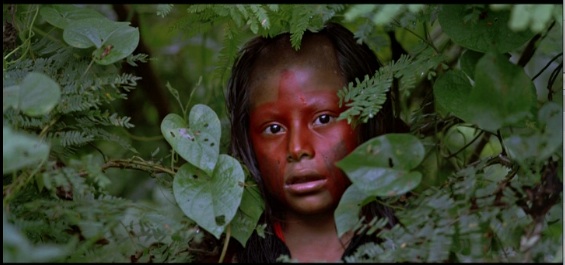
image from the film Baraka
I‘ve just finished Abram’s follow-up to his Spell of the Sensuous. The earlier book is one of the most important I have ever read, and didn’t feel the new book, Becoming Animal, added a lot to the earlier message. But here for the record are my marginal annotations as I worked through it:
- I liked his term for what Joanna Macy calls the healing and self-healing Work That Reconnects — it’s recuperation. We all need to do this heart-and-soul work if we are to be able to contribute effectively to the marathon transition humanity is now starting to make to a new post-civilization society.
- Amazing description of the sound of a flock of ducks flying overhead into a fierce headwind: “What had sounded like a single repeated utterance now varies subtly in rhythm and volume according to whether the duck speaking is testing the wind with its muscles or simply holding the status quo. Each voice alters its feel when the speaker is blown off course by the gusts, each duck using its quacks to inform the others about the state of the blast just in front of it while also apprising them of its precise location at that moment (since they’re unable to glance around without ceding ground to the wind), each also replying and reassuring the others, so that a whole array of nuanced meanings is passing back and forth above me.”
- The contrast he draws between humans who normally, when they think, temporarily take their consciousness into their heads and out of their bodies, and “other animals, in a constant and mostly unmediated relation with their sensory surroundings, [who] think with the whole of their bodies.”
- An interesting listing of the 9 ways oral cultures differ from our modern “written language” culture:
- oral awareness is more informed by place, more local in its orientation
- the act of perception is more of a two-way communication
- each entity in the place of which one is a part is ascribed its own active agency in the world
- all things are seen as expressive, intentional
- oral cultures are more aware of their lack of knowledge, of the uncertainty and mystery of everything
- the world is articulated as a story rather than as an organized collection of data; it is “verb-al” rather than “noun-al”
- time is circle and rhythm and cycle, rather than rectilinear and vectored
- the world is the product of its collective imagination, with everything a player in the dream of its creation, fluid rather than static or conceptual
- there is an acceptance that we cannot ever perceive of the world the way any other human or creature does; within the a-part-ness of our individual lives there is a pluralism, a collective appreciation of the difference and uniqueness of each entity
- The final passage of the book speaks powerfully again of the grief we all feel for gaia, the collective organism of all-life-on-earth. It is written as prose but works better, I think, in more poetic form (somewhat condensed by me):
Tonight is the winter solstice, the dark of the year.
Too many species have slid into extinction, too many forests felled
and wetlands filled;
so much beauty’s fled the world.
Life’s become cheap: with more and more of us piling in,
humans keep bashing each other in ever more creative ways —
car bombs bursting bodies
and missiles dropped from unmanned drones
splintering families, searing the land
and spattering it with blood.
An addled and anesthetized numbness
is spreading rapidly throughout our species.
There are those, however, who are not frightened of grief;
dropping deep into the sorrow, they find therein
a necessary elixir to the numbness.
When they encounter one another,
when they press their foreheads against the bark
of a centuries-old tree,
or their palms into the hand of yet another child
who has tasted prematurely of wrenching loss,
their eyes well with tears
that fall easily to the ground.
The soil needs this water. Grief is but a gate
and our tears a kind of key
opening a place of wonder that’s been locked away.
Suddenly we notice the sustaining resonance
between the drumming heart within our chest
and the pulse rising from under the ground.
The stars glimmer in the solstice dark, their faint light
mirrored in glints off the crusted snow.
Far below these blanketed fields, deep beneath the bedrock
a lustrous power slumbers, fitfully,
like a bear in its cave.
As this power sleeps, it dreams, pulsing,
its vigor radiating outward in waves,
through the slow solidity of rock,
through thickets of feldspar and quartzite and stratified soils,
outward through stems of dandelions and trunks of sequoias,
through blossoms and budded leaves
and through the craft of our fingers,
through the gleam in your lover’s eye
and the fluted music
upwelling now from the beak
of a blackbird.





Pingback: Tweets that mention Brief Notes on David Abram’s “Becoming Animal” « how to save the world -- Topsy.com
Dave,
I agree that the Spell of the Sensuous was one of the most important books I’ve read in years. He confirmed for me the continued relevance of the phenomenologists and connected their thinking to an embodied experience of pre-civilized cultures. Animal thinking “with their whole bodies” is something I can connect with imaginatively, both through experience of other animals and my own experiences in certain heightened critical moments of my own life.
I’m looking forward to reading Becoming Animal, thanks!
Tony
Took me time To test over all the feedback, however I okay appreciated the content. this proved To be perfect useful To me and likewise I’m convinced To all The commenters at present! this’s at all times good When you you can by no means solely be told, but additionally entertained! I’m certain you had pleasurable writing stuff like this content.